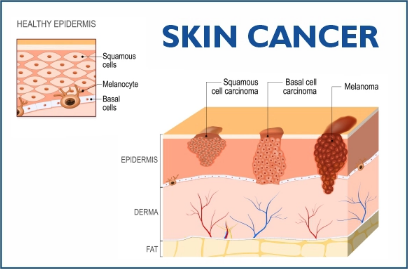Skin cancer is one of the most frequent kinds of cancer, but the good news is that it is also extremely curable, particularly when caught early. As a dermatologist, I’ve witnessed firsthand the advances in skin cancer therapy, and I’m here to help you navigate the numerous alternatives. Understanding your treatment choices might help you make more educated health-care decisions.
Types of Skin Cancer
Before diving into treatment methods, it’s essential to understand the main types of skin cancer:
- Basal Cell Carcinoma (BCC): The most common type, usually appearing as a painless raised area of skin that may be shiny or have small blood vessels.
- Squamous Cell Carcinoma (SCC): This type often appears as a red, scaly, thickened patch on sun-exposed skin.
- Melanoma: The most dangerous form, which can develop from an existing mole or suddenly appear as a new dark spot on the skin.
Treatment Options
1. Surgical Procedures
Excisional Surgery
This is the most common treatment for skin cancer, where the tumor and a margin of healthy skin around it are removed. This procedure ensures that all cancerous cells are excised.
Mohs Surgery
Mohs surgery is a specialized technique used primarily for BCC and SCC. It involves removing the cancer layer by layer and examining each layer under a microscope until no abnormal cells remain. This method preserves as much healthy tissue as possible and is highly effective.
2. Non-Surgical Treatments
Radiation Therapy
Radiation therapy uses high-energy rays to target and destroy cancer cells. It’s often used for patients who cannot undergo surgery or for cancers in hard-to-reach areas.
Cryotherapy
Cryotherapy involves freezing cancerous tissues with liquid nitrogen. It’s typically used for small, superficial skin cancers and precancerous lesions.
Topical Treatments
Topical medications, such as imiquimod and 5-fluorouracil (5-FU), can be applied directly to the skin to treat superficial BCC and SCC. These treatments stimulate the body’s immune system to attack cancer cells.
3. Advanced Treatments
Targeted Therapy
For advanced melanoma, targeted therapy drugs like vemurafenib and dabrafenib can block specific molecules involved in cancer cell growth.
Immunotherapy
Immunotherapy helps boost the body’s immune system to fight cancer. Drugs like pembrolizumab and nivolumab have shown promise in treating advanced melanoma by helping the immune system recognize and destroy cancer cells.
Chemotherapy
Chemotherapy is less commonly used for skin cancer but may be recommended for advanced cases where other treatments have failed. It involves using drugs to kill rapidly dividing cancer cells.
Post-Treatment Care
After treatment, regular follow-up appointments are crucial to monitor for any recurrence of skin cancer. Additionally, protecting your skin from the sun by using sunscreen, wearing protective clothing, and avoiding peak sun hours is essential to prevent future skin cancers.
Conclusion
The treatment of skin cancer has come a long way, offering a range of options tailored to the type and stage of the disease. Early detection and treatment are vital, so regular skin checks and prompt medical attention to any suspicious changes are paramount. If you have any concerns or symptoms, consult with a dermatologist promptly.






Comments